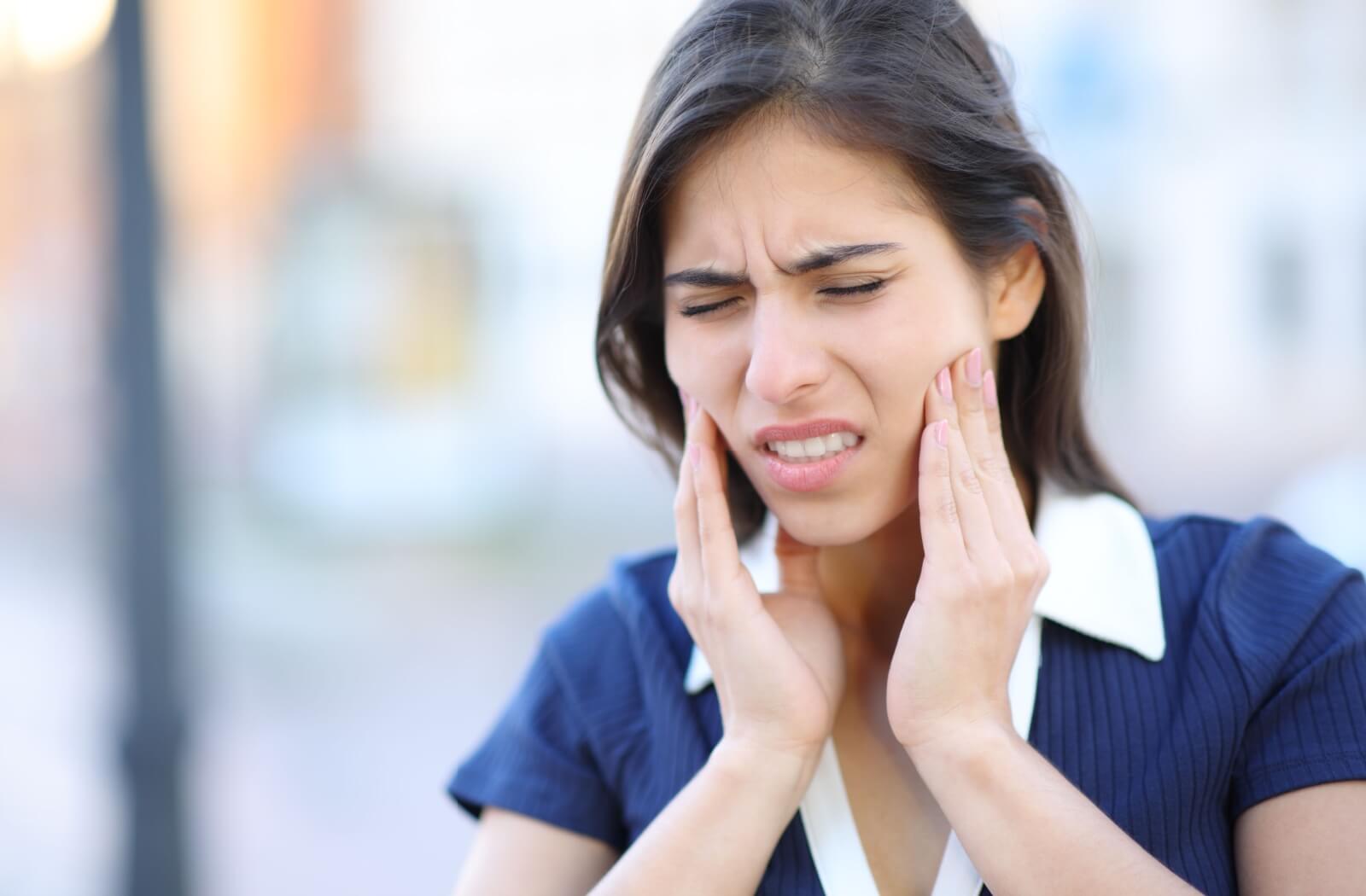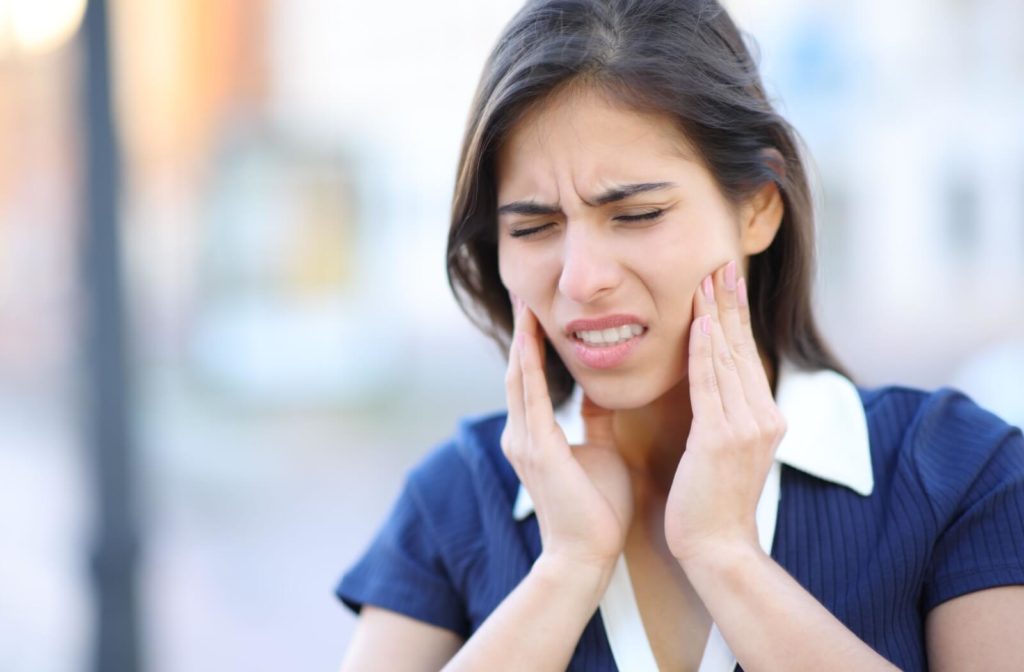The temporomandibular joint (TMJ) is a critical component of your jaw, facilitating essential functions such as chewing, speaking, and yawning. Located on either side of your head, this joint acts as a sliding hinge connecting your jawbone to your skull. Due to its intricate structure and constant use, anything that affects your TMJ can also impact your oral health.
TMJ disorders (TMDs) encompass a range of conditions affecting the TMJ, causing pain and dysfunction in the jaw joint and surrounding muscles. One of the less obvious symptoms of TMDs is tooth pain.
If not addressed, TMDs can damage your teeth and cause near-constant pain. Talking to your dentist can help pinpoint the issue and find relief.
What Is a TMJ Disorder?
The temporomandibular joint is one of the most complex joints in the body, and it plays a crucial role in your daily activities. TMJ disorders affect approximately 25–30% of the population. These disorders impact the muscles and bones around the jaw joint, causing significant pain and discomfort.
TMD can exacerbate existing dental issues as many individuals with TMJ disorder tend to clench or grind their teeth, which can damage the teeth and gums. This behaviour, often intensified by muscle tension and strain in the jaw, further aggravates dental problems and leads to tooth pain.
Symptoms & Causes of TMDs
TMD symptoms can vary from person to person, which can make it difficult to determine the source. For example, some people worry a click in their jaw is a sign of a TMD. The occasional click is perfectly normal and it’s generally only a problem if the clicking is painful and consistent.
Some common TMD symptoms include:
- Pain in facial muscles and/or jaw joint
- Neck or face pain
- Headaches
- Jaw tightness
- Jaw locking
- Difficulty opening the mouth
- Painful clicking, popping, or grating in the jaw
- Ringing in the ears (tinnitus), hearing loss, or dizziness (vertigo)
TMDs can both cause and result from other health issues. Sometimes, addressing these underlying conditions can alleviate TMJ pain. While the exact cause of TMD isn’t known, it’s related to muscle tension and could be due to several factors, including:
- Stress
- Facial trauma or injury
- Ill-fitting dental appliances
- Rheumatoid arthritis
- Loose, worn, or missing teeth
- A misshapen jaw
- Clenching and grinding your teeth, known as bruxism
- Gum problems
- Bad habits such as biting pencils or chewing ice
Teeth Grinding (Bruxism) & TMDs
Teeth grinding, or bruxism, is a common habit that can exacerbate TMDs. Sometimes you may not even be aware you’re doing it, as it commonly happens while people are asleep. The excessive pressure exerted on the teeth and jaw during grinding can lead to:
- Worn tooth enamel
- Flattened, fractured, chipped, or loose teeth
- Increased tooth pain or sensitivity
- Tired or tight jaw muscles
- Soreness in the jaw, neck, or face
- Earaches
- Headaches
- Fatigue
Since bruxism can cause direct damage to the teeth, including wear, fractures, and increased sensitivity, it can further complicate the treatment of TMDs.
Treating TMDs with Mouthguards
If you wake up with aching teeth or jaws, it could indicate sleep bruxism. Mouthguards are a widely-used treatment for bruxism, helping to reduce the stress on the jaw joint and muscles. Acting as a cushion between the upper and lower teeth, nightguards prevent grinding or clenching, alleviating undue stress.
By minimizing pressure on the muscles and joints, the body can better relax, significantly reducing pain and discomfort, thus improving sleep quality. Your dentist will take an impression of your teeth and create a high-quality custom mouthguard tailored to your unique jawline and teeth shape.
It’s essential to wear your mouthguard as directed, typically at night while sleeping or during the day if you experience pain.
Tips for Preventing TMJ-Related Tooth Pain
Preventing TMJ-related tooth pain involves adopting habits that promote overall oral health and reduce strain on the TMJ. Here are some practical tips:
- Maintain good posture: Avoid slouching and ensure your workstation is ergonomically designed to reduce strain on your neck and jaw.
- Practice stress management: Techniques such as meditation, deep breathing exercises, and yoga can help lower stress levels and prevent teeth grinding.
- Eat a soft diet: Consume soft foods that require minimal chewing to give your jaw a break.
- Use heat or cold packs: Applying heat or cold packs to the jaw can alleviate pain and reduce inflammation.
- Regular dental check-ups: Routine dental visits allow your dentist to monitor your oral health and catch any early signs of TMJ disorders.
Sleep Well & Keep Your Jaw Healthy
TMDs can indeed cause tooth pain, among other debilitating symptoms. Recognizing the signs and understanding the relationship between the TMJ and dental health is essential for effective treatment.
Don’t let TMJ-related issues go untreated. If you’re experiencing any of the symptoms discussed, schedule a dental check-up with Heritage Pointe Dental today. Taking action now can prevent further complications and help your oral health remain optimal.
Contact us to book your appointment and take the first step towards a pain-free, healthy smile.



